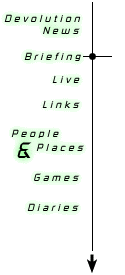
Welsh Devolution
Briefing by Vaughan Roderick, Welsh Affairs Editor, BBC Wales
Part 5. Yeah or Nay
The two campaigns
For a time after the General Election it appeared that there might not be a "No" campaign. In fact one has emerged although only as a pale shadow of the "Yes" operation.
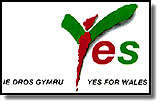
|
The "Yes" Lobby
"Yes for Wales"
"Yes for Wales" is the main umbrella group on the "Yes side". Launched before the General Election, it has budget of around £100,000 . "Yes for Wales" has staged a planned roll-out of "Yes" groups, both local and sectoral, everything from "Actors say Yes" to "Ystradgynlais Says Yes". However many of these launches have been for the media's benefit .Organising genuine local-campaigning has largely been left to the political parties.
The Labour Party
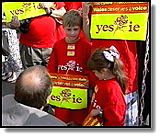
Labour says "Yes"
The result of the referendum will depend on whether Labour can deliver its core vote. The party’s own campaign is heavily geared to equating a "Yes" vote with a Labour vote. The party has produced its own literature and campaign materials and while the party won’t say how much it plans it doesn’t dispute a figure of around £200,000
The Liberal Democrats
The Liberal Democrats - while calling for a stronger law-making "Senedd" - have endorsed Labour plans .The party is running its own campaign in its strong areas and using materials provided by "Yes for Wales" in other parts of the country.
Plaid Cymru
The memory of 1979 is a bitter one for Plaid Cymru members. Then they found themselves almost alone in campaigning for proposals that had all but been abandoned by Labours activists. The party was determined not to find itself in the same situation again and considered adopting a neutral posture, knowing that its supporters would vote "yes" whatever the party did. Eventually, reassured by the vigour of Labour’s campaign, the party did endorse a "Yes" vote although most of its campaigning is taking place under the umbrella of "Yes for Wales"
Also supporting the “Yes” campaign are the Wales TUC and its member unions, most of the Free Churches and a range of prominent Welsh personalites. Unlike in 1979 the “Yes” campaign has succeeded in attracting some support from Conservatives. The "grand old man” of Welsh Conservatism Sir Wyn Roberts, who served at the Welsh Office from 1979 until 1995, seems to be edging towards the "Yes" camp - a move that would dismay Conservatives.
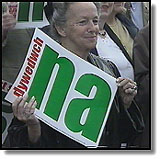
|
| Saying "No" to Devolution |
The No Campaign
Following their election wipe-out, the Conservatives in Wales embarked on attempt to establish an umbrella campaign to rival "Yes for Wales" fearing that to campaign as a party for a "No" vote would ensure defeat. Whether the Conservative were in fact the marriage brokers or not an umbrella group did eventually emerge.
"Just Say No"
Financed by the retired Welsh financier Sir Julian Hodge (now living in Jersey) "Just say No" is fronted by Sir Julian’s son, Robert; two dissident Labour members from the Rhondda, Betty Bowen and Carys Pugh and the former Conservative candidate for Worcester Nicholas Bourne.
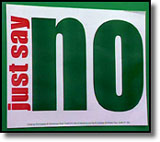
|
The Labour rebels
A number of Labour MPs have voiced their opposition to the proposals or reservations about some aspects of the plans.The most vigorous opponent has been Blaenau Gwent MP Llew Smith who claimed to have been threatened with de-selection by the Welsh secretary Ron Davies. Also opposed to the plans are Swansea West MP Allan Williams and the MP for Ogmore, Sir Ray Powell. MPs expressing reservations include Denzil Davies (Llanelli) and Ted Rowlands (Merthyr and Rhymney)
Another group of Labour MPs, including most of the new intake, consider that Labour’s plans don’t go far enough - a reflection of the balancing act the party has had to achieve.
The Conservative Party
Welsh Conservatives find themselves in a difficult position. Having fought the election on an avowed Unionist platform, they find themselves reduced to a party with no MPs and only 42 councillors in the whole of Wales.While the party is, by instinct, anti-devolution some see an Assembly - particularly one elected by proportional representation - as the easiest route back to political relevance in Wales. To campaign openly as a party for a NO vote would, they believe, make if very difficult to campaign successfully for seats on an Assembly in a few years time.
The CBI and the Business Community
Unlike in 1979 the business community has kept a low profile during the debate. While most business people do oppose the plans they appear to wish to avoid offending the new government in its early days.
- Introduction
-
1. 1979 and all that
A comparison of the 1979 and 1997 proposals and campaigns -
2. Wales and Westminster
The relationship of the Assembly to Westminster and possible future conflicts -
3. At what cost?
The cost of an Assembly -
4. You decide
The Referendum -
5. Yeah or Nay
The two campaigns -
6. What if?
Post-referendum scenarios

